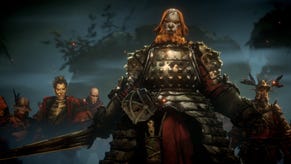Join the Covenant: The hidden meta-game of Dark Souls
Just when you think you've got Demon's Souls sorted out, Dark Souls introduces a new multiplayer mechanic that turns everything upside down.
When Demon’s Souls released in 2009 it broke a number of conventions – like not killing off your players before you explain how the game works – and introduced a new kind of quasi-asymmetrical multiplayer unlike anything before it.
Dark Souls, at first glance, offers the same kind of experience. After earning the right to leave messages by finding the game’s first proper merchant, players can leave and rate hint messages around the landscape. As with the first game, these messages vary from life-saving through to deliberately – and hilariously – misleading.
Later, having shown the balls and brains to pass the first proper boss, players can claim an item which allows them to participate in co-operative boss runs, and with a little diligent searching, score a consumable which allows them to take the PvP route by invading innocent bystanders’ worlds.
So far, so Demon’s Souls. The gradual release of online components is a welcome change, given the enormous pool of newbies the game’s hype has brought, but there’s little described so far beyond what could be found in From Software’s first offering. Where are the revolutionary new elements we were promised, a dangling carrot for the focused high-level players of Demon's Souls?
Oh, they’re there. Once beyond the tutorial environment, if players ignore the obvious path and explore the starting hub carefully they’ll meet an NPC who extends them an offer to join a covenant. Ignorant of what that means but seeing no downside, many new players do.
It’s only when you pass over the opportunity, that you might notice the Way of White's effects, when a red phantom appears in your world and beats the living crap out of you.
The Way of White, as it is known, may seem to make little difference to the player’s experience; it’s only when you make a second run, and pass over the opportunity, that you might notice its effects, or rather, the lack of them, when a red phantom appears in your world and beats the living crap out of you.
When you’re done screaming, flailing, and asking repeatedly “what the hell just happened?” you may start investigating, and discover that the Way of White is a peaceful covenant focussed on co-op play. Players are far more likely to find their world abutting those of fellow members, eager to lend a helping hand in difficult situations. Without the protection of the covenant, chances are higher you’ll come up against a less benevolent adventurer.
Advanced players – veterans of Demon’s Souls and its incredibly high level PvP scene – hold out for other covenants, and it’s here that things get really interesting.
From Software keeps track, you see, of those who “sin” – and all of the actions which constitute sin have not yet been puzzled out by the community. There’s one covenant entirely devoted to punishing these transgressions. Join up, and you may be summoned as a blue phantom to deal with a player who enjoys the shock and awe of invading as a red phantom.
At higher soul levels, red phantoms are, almost universally, very skilled PvP players who work diligently to discover the most effective equipment, strategies and abilities to take down human controlled characters – a vastly different prospect to surviving the rigours of the game’s carefully crafted dungeons.
To take on the mantle of a blue phantom is to invite yourself to confront these PvP powerhouses. This is where From Software gave itself a pat on the back and a payrise for being an utter clever clogs, because many of the best PvP players want to try themselves against others of their ilk, making this role of guardian naturally attractive.
The interaction of the covenants dedicated to red and blue phantoms creates a power dynamic which favours those who give back with the kind of challenge they relish, and the easiest covenant to find gives those only interested in PvE an option to protect themselves.
By creating these almost guild-like groupings, which cater strongly to the multiple play-throughs and ongoing multiplayer of Demon’s Souls, From has handed the community the power to self-regulate and police in a multiplayer scenario without game masters, voice or text communication. And we’ve only touched on three of the game’s many covenants, the nuances of which are still being explored by the infant player base.
That covenants and their effects are only now being fully explored and explained on the game’s many guides, wiki and FAQ pages is absolutely true to From’s declared intention with both games – to foster a community which shares information and works together to demolish the deliberately unfair challenges placed before it.
The Souls series presents a new kind of game, and it’s crafting new kinds of players. Where are these players going to take their new skills and aesthetics? What kind of games will we see in the wake of From Software’s unforgiving design?











